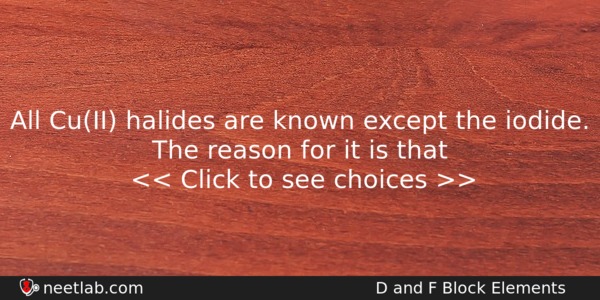| ⇦ | 
| ⇨ |
All Cu(II) halides are known except the iodide. The reason for it is that
Options
(a) iodide is a bulky ion
(b) Cu²⁺ oxidizes iodide to iodine
(c) Cu²⁺ (aq) has much more negative hydration enthalph
(d) Cu²⁺ ion has smaller size
Correct Answer:
Cu²⁺ oxidizes iodide to iodine
Explanation:
No explanation available. Be the first to write the explanation for this question by commenting below.
Related Questions: - An organic compound containing C, H, N gave the following analysis
- Gadolinium belongs to 4f series. Its atomic number is 64
- In the equation of state of an ideal gas PV = nRT, the value of the universal gas
- Cassiterite is concentrated by
- Which of the following does not acts as Lewis acid
Topics: D and F Block Elements
(91)
Subject: Chemistry
(2512)
Important MCQs Based on Medical Entrance Examinations To Improve Your NEET Score
- An organic compound containing C, H, N gave the following analysis
- Gadolinium belongs to 4f series. Its atomic number is 64
- In the equation of state of an ideal gas PV = nRT, the value of the universal gas
- Cassiterite is concentrated by
- Which of the following does not acts as Lewis acid
Topics: D and F Block Elements (91)
Subject: Chemistry (2512)
Important MCQs Based on Medical Entrance Examinations To Improve Your NEET Score
18000+ students are using NEETLab to improve their score. What about you?
Solve Previous Year MCQs, Mock Tests, Topicwise Practice Tests, Identify Weak Topics, Formula Flash cards and much more is available in NEETLab Android App to improve your NEET score.
Share this page with your friends

Leave a Reply